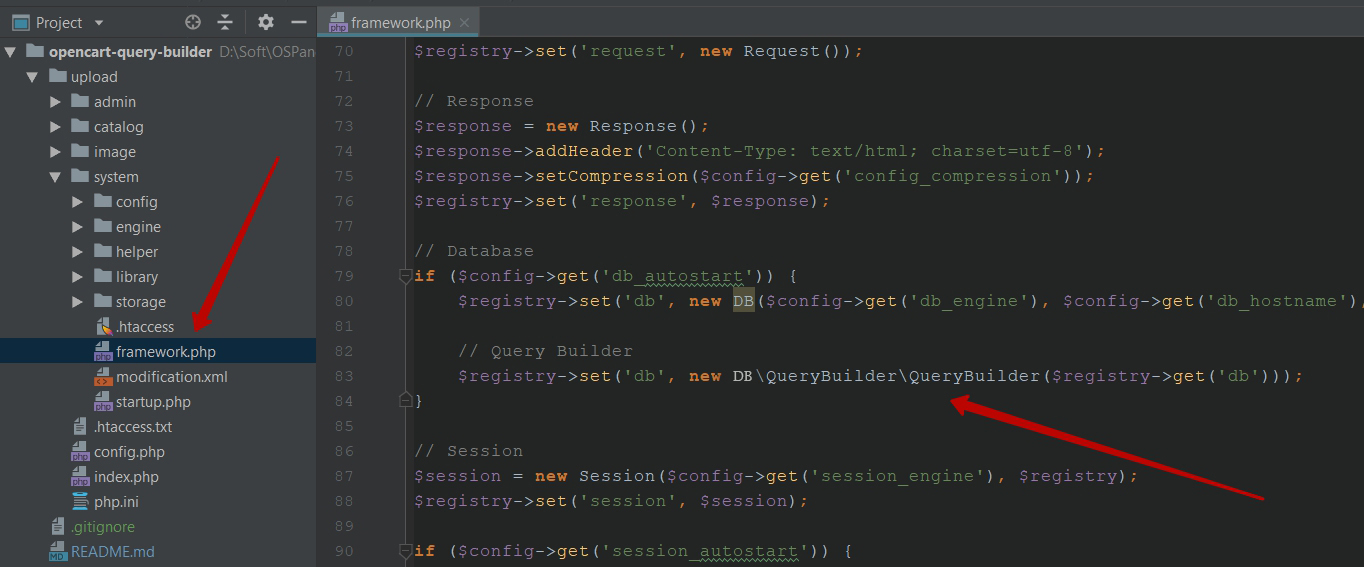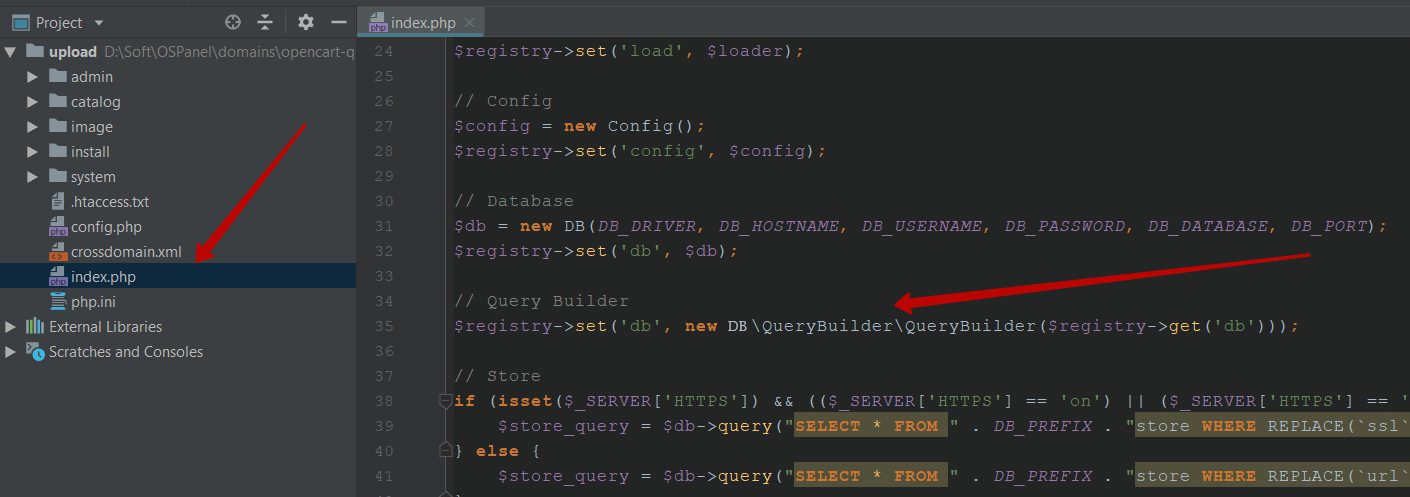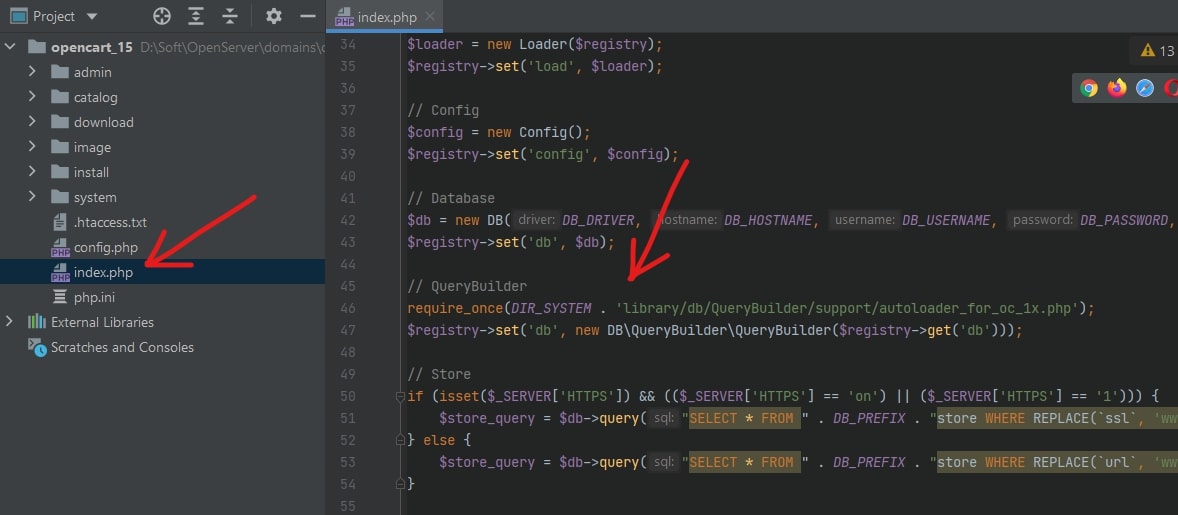- Compatibility
- Installation
- General Info
- Selecting data
- Inserting data
- Updating data
- Deleting data
- Conditions
- DB Logger
Opencart Query Builder provides convenient interface to work with database. It is totally fast and secure.
Features:
- super simple interface (inspired by modern frameworks: laravel, yii, codeigniter...)
- no more tons of
$this->db->escape('...'), builder automaticaly makes secure sql - no more table prefixes, just table names
- doesn't break your code (
$this->db->query()and other default functions still work) - easy debug functionality
Let see how it looks:
// somewhere above in controller
$db = $this->db;
// Take exact what you need:
$email = $db->table('customer')->find(1)->get('email');
// How to set minimal price for your products? Easy:
$db->table('product')->where('price <', 100)->set('price', 100);
// Happy customer bought three products at a time? Don't forget to mark it:
$db->table('product')->find(1)->decrement('quantity', 3);Like it? More interesting features and code examples you will find bellow.
Compatible with OpenCart 1.*, OpenCart 2.* and OpenCart 3.*
Tested only with: MySql, MariaDB
Upload the contents of the 'upload' folder to the root directory of your OpenCart installation.
To start using QueryBuilder, we need tell our Registry to use it instead of our old DB class. To do it, after:
$registry->set('db', ...);write this:
// QueryBuilder
$registry->set('db', new DB\QueryBuilder\QueryBuilder($registry->get('db')));OpenCart 2.2.* or higher:
OpenCart 2.0.0 - 2.1.0.2:
OpenCart 1.* (first versions of OpenCart also need autoloader):
After installation, your old $this->db class has new method - table. Method table returns a fluent query builder instance for the given table, which allows you to chain more constraints onto the query and then run other commands to work with your data.
// somewhere in controller
$db = $this->db;
// Retriving instance of query working with oc_product table.
$query = $db->table('product');Note that there is no need to prefix your table names with DB_PREFIX, query builder will do it automatically.
If your query would work with two or more tables, usually you must use table prefixes for your fields:
// retrive products models and names (where few products left)
$products = $db->table('product')
->join('product_description', 'product_id')
->where('product.quantity < ', 10)
->get(['product.model', 'product_description.name']);To write less code, you always can add your own aliases for each table:
// Add alias `p` to `oc_product` table
$products = $db->table('product p')
->join('product_description pd', 'product_id')
->where('p.quantity', 10);
->get(['p.model', 'pd.name']);Also you could use AS keyword if you like (case insensitive):
$query = $db->table('product as p')->...;
$query = $db->table('product AS p')->...;Retrieving data from database can be done by get method.
Select all data from a table:
// SELECT * FROM `oc_product`
$products = $db->table('product')->get();Select only specific fields:
// SELECT `product_id`,`model` FROM `oc_product`
$products = $db->table('product')->get(['product_id', 'model']);Get fields as aliases:
// SELECT `product_id` AS `id` FROM `oc_product`
$products = $db->table('product')->get(['product_id' => 'id']);Select content of the specific field:
$name = $db->table('customer')->find(1)->get('firstname');
// $name => 'John';If database returns more than one row, result will be array of values:
$names = $db->table('customer')->get('firstname');
// $names => array('John', 'Leo', 'Michael', ...);Check if record with specific primary key exists:
if ( $db->table('product')->has($id) ) {
...
} else {
exit('There is no product with id ' . $id . '!');
}Aggregates:
$cnt = $db->table('product')->count();
$min = $db->table('product')->min('price');
$max = $db->table('product')->max('price');
$avg = $db->table('product')->avg('price');
$sum = $db->table('product')->sum('price');You may use the where method on a query builder instance to add where clauses to the query. The most basic call to where requires two arguments. The first argument is the name of the column. Also after column name may be added condition operator. The second argument is the value to evaluate against the column.
where(string field, mixed value)
// ... WHERE `product_id` = 1 ...
$query->where('product_id', 1);
// ... WHERE `price` > 200 ...
$query->where('price >', 200);
// ... WHERE `product_id` IN (1,2,3) ...
$query->where('product_id', [1, 2, 3]);
// ... WHERE `product_id` NOT IN (1,2,3) ...
$query->where('product_id !=', [1, 2, 3]);
// ... WHERE `name` IS NULL ...
$query->where('name', null);
// ... WHERE `ean` IS NOT NULL ...
$query->where('ean !=', null);If you wish to add multiple conditions, you are free to call where method a few times. All conditions will be divided by AND keyword:
// ... WHERE `firstname` = 'John' AND `lastname` = 'Dou'
$query->where('firstname', 'John')->where('lastname', 'Dou');If you need to split your conditions by OR keyword, you may use orWhere method:
// ... WHERE `firstname` = 'John' OR `firstname` = 'Leo'
$query->where('firstname', 'John')->orWhere('firstname', 'Leo');where(string rawSql)
// ... WHERE price BETWEN 100 AND 200 ...
$query->where('price BETWEN 100 AND 200');where(array conditions)
// ... WHERE `price` = 100 ...
$query->where(['price' => 100]);
// ... WHERE (`firstname` = 'John' AND `age` > 20)
$query->where([
'firstname' => 'John',
'age >' => 20
]);Use OR operator:
// ... WHERE (`firstname` = 'John' OR `age` > 20)
$query->where([
'firstname' => 'John',
'or',
'age >' => 20
]);Find result by its primary key:
// ... WHERE `primary_key_field` = 1 ...
$query->find(1);
// ... WHERE `primary_key_field` IN (1,2,3) ...
$query->find([1,2,3]);To limit the number of results returned from the query, you may use limit method.
// ... LIMIT 10 ...
$query->limit(10);Also query builder provides skip and page methods for simle navigation through database records:
// ... LIMIT 5, 10 ...
$query->limit(10)->skip(5);
// ... LIMIT 20, 10 ...
$query->limit(10)->page(3);// ... ORDER BY `price` ...
$query->sortBy('price');
// ... ORDER BY `price` DESC ...
$query->sortBy('price', 'desc');
// ... ORDER BY `price` ASC, model DESC ...
$query->sortBy([
'price' => 'asc',
'model' => 'desc'
]);Also it is possible to use raw expressions:
// ... ORDER BY RAND() ...
$query->sortBy('RAND()');But note that example above has more convenient solution by using random() method.
join, crossJoin:
// ... INNER JOIN `oc_product_description` ...
$db->table('product')->join('product_description');
// ... CROSS JOIN `oc_product_description` ...
$db->table('product')->crossJoin('product_description');Other join variants:
// ... INNER JOIN `oc_manufacturer` USING(`manufacturer_id`)
$db->table('product')->join('manufacturer', 'manufacturer_id');
// ... INNER JOIN `oc_manufacturer` AS `m` ON `p`.`manufacturer_id` = `m`.`manufacturer_id`
$db->table('product p')->join('manufacturer m', 'p.manufacturer_id', 'm.manufacturer_id');
// ... INNER JOIN `oc_product_description` AS `pd` ON (p.product_id = pd.product_id AND `pd`.`language_id` = 1)
$db->table('product p')->join('product_description pd', [
'p.product_id = pd.product_id',
'pd.language_id' => 1
]);Also there are leftJoin and rightJoin methods, which accept same type of input conditions. For example:
// ... LEFT OUTER JOIN `oc_manufacturer` AS `m` ON `p`.`manufacturer_id` = `m`.`manufacturer_id`
$db->table('product p')->leftJoin('manufacturer m', 'p.manufacturer_id', 'm.manufacturer_id');
// ... RIGHT OUTER JOIN `oc_manufacturer` AS `m` ON `p`.`manufacturer_id` = `m`.`manufacturer_id`
$db->table('product p')->rightJoin('manufacturer m', 'p.manufacturer_id', 'm.manufacturer_id');Query Builder also provides first, last and random methods for easiest way to work with data in database. These methods have one optional parameter - limit of results. By default limit equals 1.
$query->first();
$query->first(10);
$query->last();
$query->last(10);
$query->random();
$query->random(10,.."'");
// Example (get email of last registered customer)
$email = $db->table('customer')->last()->get('email');To insert data into database use add method:
$id = $db->table('product')->add([
'model' => 'm1',
'price' => 100,
...
]);Insert multiple records:
$ids = $db->table('product')->add([
[
'model' => 'm1',
'price' => 100,
...
], [
'model' => 'm2',
'price' => 620,
...
],
...
]);To update field in database use set method:
$db->table('product')->set('price', 200);
$db->table('product')->find(1)->set('price', 200);Update multiple fields:
$db->table('product')->find(1)->set([
'model' => 'm2',
'price' => 200,
...
]);The query builder also provides convenient methods for incrementing or decrementing the value of a given column:
$db->table('customer')->increment('followers');
$db->table('customer')->increment('followers', 3);
$db->table('customer')->decrement('followers');
$db->table('customer')->decrement('followers', 3);Also there is a toggle method for switching boolean values:
$db->table('product')->toggle('status');Notice, all methods above (set, increment, decrement and toggle) return count of updated rows:
$countUpdated = $db->table('product')->where('price <', 100)->set('status', 0);To delete records from database use delete method:
$db->table('product')->delete();
$db->table('product')->find(1)->delete();If you wish to truncate the entire table, which will remove all rows and reset the auto-incrementing ID to zero, you may use the clear method:
$db->table('product')->clear();Notice, delete and clear methods also return count of deleted rows:
$countDeleted = $db->table('product')->where('price <', 100)->delete();Query builder provides some methods for debugging:
// Enable logger (by default it's disabled)
$db->enableLog();
// Available methods
$queries = $db->getExecutedQueries();
$db->printExecutedQueries();

